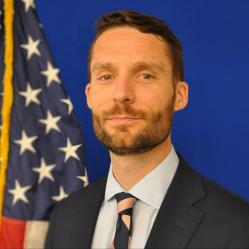

9:30 am EDT - 10:45 am EDT
Past Event
 China’s growing activism in international rulemaking and institutions has provided a glimpse into its evolving approach to international institutions, rules, and norms. What is the scale of Beijing’s ambitions? What tools will it use to advance them?
China’s growing activism in international rulemaking and institutions has provided a glimpse into its evolving approach to international institutions, rules, and norms. What is the scale of Beijing’s ambitions? What tools will it use to advance them?
On September 21, the Foreign Policy program at Brookings hosted a webinar as part of the “Global China: Assessing China’s Growing Role in the World” series. Brookings Vice President and Director of Foreign Policy Suzanne Maloney opened the event by observing that it coincided with the 75th anniversary of the United Nations, an opportune moment for reflection. Nonresident Fellow Patrick Quirk moderated the panel discussion.
David M. Rubenstein Fellow Lindsey Ford argued: “What the Chinese have done is try to neutralize the significance of U.S. alliances,” pointing to the 2016 decision to install the Terminal High Altitude Area Defense (THAAD) missile defense system in South Korea as an example, which “resulted in a lot of economic coercion [from China] that shaped the decisions South Koreans are willing to take on trilateral cooperation” with the United States and Japan. “We’re really talking about things from bilateral relations to multilateral institutions like NATO [the North Atlantic Treaty Organization],” Ford said. “When it comes to building regional security networks, the real opportunities [for China] are areas like Central Asia and the Mekong region where the U.S. has had less of a role.” She argued that the U.S. must modernize its alliances and cannot afford to rest on the laurels of the network power built during the 20th century.
John C. Whitehead Visiting Fellow in International Diplomacy Jeffrey Feltman highlighted China’s greater commitment to the U.N., pointing out that China is now the second-largest contributor in terms of dues and saying: “Given China’s weight in the world, it makes sense that it wants to have a louder voice in the U.N.” Feltman said many countries in the global south welcome this, because “they were uncomfortable with where the U.S. and Europe were pushing the global agenda inside the United Nations” — especially on human rights. Feltman said that a more productive model for the U.N. Security Council in particular would be “to have some of the middle powers work with Washington and Beijing to deescalate problems and then bring it to the Security Council, but do not expect the Security Council itself to solve the issues, merely to endorse something that’s been decided offline.”
Senior Advisor at the International Republican Institute David Shullman noted that China had found willing partners in many developing countries. “In so many of these countries, you have longstanding problems around corruption, a lack of transparency, a lack of a healthy media sector, weak judiciary sectors and rule of law,” Shullman said. “So there’s a lot of weakness there that China is able to exacerbate and take advantage of.” He argued Belt and Road Initiative deals between Chinese contractors and corrupt foreign officials “create levels of debt and dependency” and are bad for their financial solvency. He recommended that the United States use diplomatic engagement to champion democratic actors and hold illiberal actors to account, ideally “with our allies and partners as much as possible, so it’s not just the United States versus China in some great power competition.”
Finally, Sophie Richardson, China director at Human Rights Watch, described China’s priorities at the U.N.’s Human Rights Council (UNHRC). “China will run to rejoin the council this fall and it will almost certainly be reelected,” Richardson said, adding: “I think that is going to put even more pressure on countries that really do care [for] the health of the system as a whole to work hard and set a very ambitious agenda” for human rights. She said the UNHRC elections could be more meaningful if states were obliged to campaign. “I think a lot of the tools are there to make it an effective institution if member states actually uphold the obligations and the expectations,” she said, “which you know clearly China is not.” Richardson explained that a “strong emphasis on working with other like-minded governments, not just at the Human Rights Council, but on other kinds of initiatives to promote or protect human rights defenders” would strengthen human rights worldwide.
All the panelists discussed how China has sought to use multilateral and bilateral institutions to safeguard its own political system and values, as well as how it may try to leverage its international power vis-à-vis the United States and other countries.
September 21, 2020
9:30 am - 9:35 am
Moderator

Panelist



Vanda Felbab-Brown
April 16, 2024

Michael E. O’Hanlon, Ivan Kanapathy, Rorry Daniels, Thomas Hanson, Ryan Hass, Patricia M. Kim, Emilie Kimball
April 16, 2024

Ryan Hass, Colin Kahl
April 5, 2024